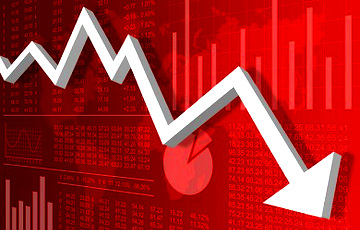Russian Government Debt Market Hits Rock Bottom
2- 28.10.2024, 16:23
- 6,364

To its lowest point since 2009.
The sharp tightening of the Bank of Russia's monetary policy, which brought the interest rate to its highest in more than 20 years, has sent the Russian government debt market into a tailspin, The Moscow Times writes.
The prices of federal loan bonds (FLB), which the Finance Ministry issues to borrow money for the budget, fell to 15-year lows on Monday.
The RGBI index, which tracks FLB quotes on the Moscow Exchange, fell to 97.33 points as of 15.43 in Minsk, its lowest point since 2009. Since the beginning of the year, the index has fallen by almost 20% and has consistently broken through the lows of the first weeks of the war and the 2014 crisis.
FLB sales intensified after the Central Bank meeting on Friday, notes BCS analyst Dmitry Babin: citing the threat of inflation, the regulator raised the key rate for the eighth time in a row, to 21% per annum, and also warned that it could increase it to 23% at the December meeting.
As a result, rates on Russian government debt securities also jumped: if last summer the Ministry of Finance could borrow for the budget at 10% per annum, now FLB yields exceed 20%.
This "makes life more difficult for the Ministry of Finance", which has to spend more and more on interest payments on bonds, notes investment banker Evgeny Kogan: next year, servicing the national debt will cost the treasury 3.2 trillion rubles, which is 40% more than this year. At the same time, real expenses may be even higher: the budget was drawn up based on an average key rate of 15%, Kogan recalls.
The economy and budget will have to live with high interest rates for a long time: the average value of the Central Bank's key rate is unlikely to fall below 20% next year, warns Rosbank analyst Evgeny Koshelev: the government plans to continue increasing military spending, pouring money into defense plants and handing out generous bonuses to contract soldiers. This creates an overhang of money supply in the economy. And the Central Bank is trying to “lock this surplus” in banks by raising the rate, notes Finam analyst Alexander Potavin. While rates are high, both people and companies send rubles to deposits, he explains. If this money flows into consumption, the economy may face a new surge in inflation, Potavin warns.
In terms of the nominal rate level, Russia has already overtaken African countries and bankrupt countries: the current rate of the Central Bank of the Russian Federation is higher than in Zambia (13.5%), Gambia (17%), Pakistan (17.5%) and Angola (19.5%). VTB CEO Andrei Kostin did not rule out that the rate could reach 25%, the level with which Putin began his first term in 2000.











